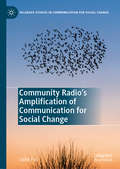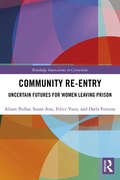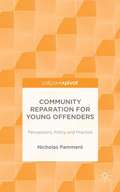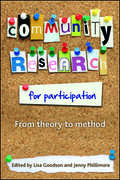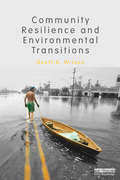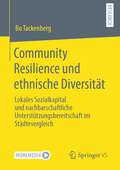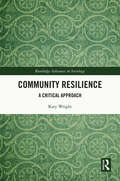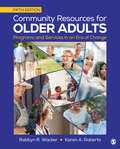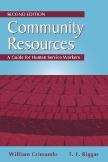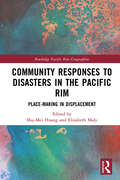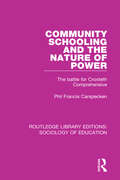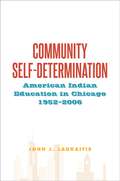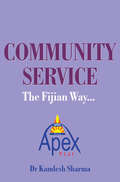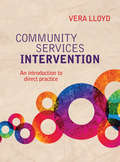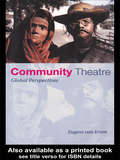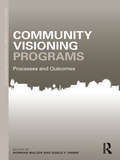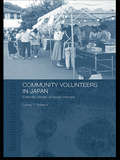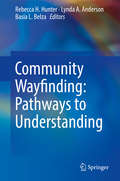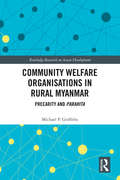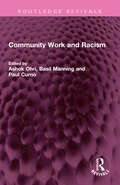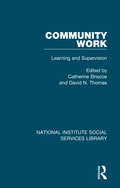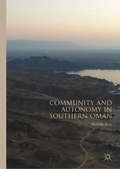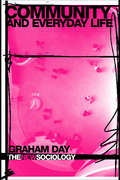- Table View
- List View
Community Radio's Amplification of Communication for Social Change (Palgrave Studies in Communication for Social Change)
by Juliet FoxThis book explores how community radio contributes to social change. Community radio remains a unique communication platform under digital capitalism, arguably capable of expanding the project of media democratisation. Yet there is a lack of in-depth analysis of community radio experience, and a dearth of understanding of its functionality as an actively transformative tool for greater equity in society. This project combines the theoretical positions of the political economy of communication with a citizen’s media perspective in order to interrogate community radio’s democratic potential. By presenting case studies of two radio stations in Melbourne and Lospalos, and applying multiple research methods, the book reveals community radio’s amplification of media participation, communication rights, counter-hegemony and media power — in effect, its distinct regenerative voice.
Community Re-Entry: Uncertain Futures for Women Leaving Prison (Routledge Innovations in Corrections)
by Alison Pedlar Susan Arai Felice Yuen Darla FortuneIn their journeys to prison and community re-entry, women leaving prison tend to share overarching challenges connected to lives of poverty, trauma, and abuse. Community Re-Entry: Uncertain Futures for Women Leaving Prison provides a rare opportunity to hear directly from women who have spent time in a Canadian federal penitentiary. Based on more than a decade of engagement with women in prison, the authors gathered rich and personal information on women’s lived experiences during incarceration and what they anticipated and hoped for on release. This book relates their narratives and the authors’ critical analysis of their experiences both within and outside prison. By bridging relational and other critical theories (critical feminist, critical race, critical disability, and post-structural understandings) with lived experience, this volume sheds light on the challenges incarcerated women face as they seek to return to the community as valued and contributing citizens. Community Re-Entry’s unique perspective on women’s post-imprisonment policy will appeal to academics, community-based advocates and activists, and undergraduate and postgraduate students studying criminology and social science courses on gender and crime, correctional policy, and qualitative research methods.
Community Reparation for Young Offenders: Perceptions, Policy and Practice
by Nicholas PammentCommunity reparation for young offenders involves unpaid work such as painting and decorating, litter picking and graffiti removal. Whilst remaining a major part of the youth justice landscape, concern has been raised about the poor quality of workplace provision. In this book, Nicholas Pamment provides the first fully researched examination of community reparation. He establishes the most comprehensive model for the effective delivery of unpaid work, demonstrating the importance of 'meaningful' work placements which facilitate key employability skills, associated with reductions in re-offending. Drawing upon empirical evidence and the experience of offenders, he warns against a formulaic approach to workplace allocation, where there is an over-reliance on low cost menial tasks. His timely study concludes that more attention needs to be paid to the rehabilitative potential of community reparation, requiring the commitment and dedication of service providers.
Community Research for Participation: From Theory to Method
by Lisa Goodson and Jenny PhillimoreThis book bridges a major gap in knowledge by considering, through a range of reflexive chapters from different disciplinary backgrounds, both theoretical and practical issues relating to community research methodologies. The international contributors consider a number of key epistemological, ontological and methodological questions. They explore what community peer research means in a range of settings, for a range of people, for the quality of data and subsequent findings, and for the production of rigorous social research. The collection will also stimulate thinking about how methodological advancement can be made in the field. It is the first book of its kind to combine practical and methodological reflections with clearly presented recommendations about how the approach can be used. Presenting the latest thinking in the field and providing summaries, case studies and review questions, 'Community research for participation' will be invaluable to students, researchers, academics and practitioners who aim to place community members at the centre of their research.
Community Resilience and Environmental Transitions
by Geoff WilsonThis book discusses the resilience of communities in both developed and developing world contexts. It investigates the notion of ‘resilience’ and the challenges faced by local communities around the world to deal with disturbances (natural hazards or human-made) that may threaten their long-term survival. Using global examples, specific emphasis is placed on how learning processes, traditions, policies and politics affect the resilience of communities and what constraints and opportunities exist for communities to raise resilience levels.
Community Resilience in Natural Disasters
by Diane Bretherton Anouk RideTold through the voices of local community leaders, this book analyzes how communities respond to natural disasters and how outsiders contribute positively - or negatively - to their response, promoting debate on the role of aid and the media in times of crisis.
Community Resilience und ethnische Diversität: Lokales Sozialkapital und nachbarschaftliche Unterstützungsbereitschaft im Städtevergleich
by Bo TackenbergAus einer soziologischen Perspektive widmet sich die Arbeit dem Konzept der Community Resilience, mit dem wesentliche Anpassungs- und Bewältigungsressourcen gesellschaftlicher Herausforderungen - wie Krisen, Katastrophen und sozialen Umbruchsphasen - in sozialen Prozessen und der kollektiven Leistungsfähigkeit der Bevölkerung verortet werden. Mittels Mehrebenenmodellierung wird untersucht, inwieweit ethnische Diversität und soziale Benachteiligung im Stadtteil Einfluss auf die Wahrnehmung lokalen Sozialkapitals und kollektiver Wirksamkeit sowie der nachbarschaftlichen Unterstützungsbereitschaft nehmen. Zudem wird untersucht, in welchem Verhältnis lokales Sozialkapital, kollektive Wirksamkeit und nachbarschaftliche Unterstützungsbereitschaft zueinander stehen.
Community Resilience: A Critical Approach (Routledge Advances in Sociology)
by Katy WrightThis book provides an alternative perspective on community resilience, drawing on critical sociological and social policy insights about how people individually and collectively cope with different kinds of adversity. Based on the idea that resilience is more than simply an invention of neoliberal governments, this book explores diverse expressions of resilience and considers what supports and undermines people’s resilience in different contexts. Focusing on the United Kingdom, it examines the contradictions and limitations of neoliberal resilience policies and the role of policy in shaping how vulnerabilities are distributed and how resilience is manifested.The book explores different types of resilience including planning, response, recovery, adaptation and transformation, which are examined in relation to different types of threat such as financial hardship, disasters and climate change. It argues that resilience cannot act as an antidote to vulnerability, and aims to demonstrate the importance of shared institutions in underpinning resilience and in preventing socially created vulnerabilities. It will be of interest to academics, students and well-informed practitioners working with the concept of resilience within the subject areas of Sociology, Social Policy, Human Geography, Environmental Humanities and International Development.
Community Resources for Older Adults: Programs and Services in an Era of Change
by Karen A. Roberto Robbyn R. WackerCommunity Resources for Older Adults provides comprehensive, up-to-date information on programs, services, and policies pertaining to older adults. Authors Robbyn R. Wacker and Karen A. Roberto build reader awareness of programs and discuss how to better understand help-seeking behavior, as well as explain ways to take advantage of the resources available to older adults. The substantially revised Fifth Edition includes new topics and updated research, tables, and figures to help answer key questions about the evolution and utilization of programs for older adults and the challenges that service providers face.
Community Resources for Older Adults: Programs and Services in an Era of Change
by Karen A. Roberto Robbyn R. WackerCommunity Resources for Older Adults provides comprehensive, up-to-date information on programs, services, and policies pertaining to older adults. Authors Robbyn R. Wacker and Karen A. Roberto build reader awareness of programs and discuss how to better understand help-seeking behavior, as well as explain ways to take advantage of the resources available to older adults. The substantially revised Fifth Edition includes new topics and updated research, tables, and figures to help answer key questions about the evolution and utilization of programs for older adults and the challenges that service providers face.
Community Resources: A Guide for Human Service Workers
by T. F. Riggar William CrimandoWritten by credentialed practitioners, this book provides detailed explanations and descriptions of the most prominent and beneficial human-service agencies. Also included is information on agency personnel, as well as specific organizational certifications, licensing, and accreditation. It is also an invaluable aid to professional counselors for investigating agencies and/or service(s) for client referral. <P><P><i>Advisory: Bookshare has learned that this book offers only partial accessibility. We have kept it in the collection because it is useful for some of our members. Benetech is actively working on projects to improve accessibility issues such as these.</i>
Community Responses to Disasters in the Pacific Rim: Place-making in Displacement (Routledge Pacific Rim Geographies #12)
by Shu-Mei Huang Elizabeth MalyCommunity Responses to Disasters in the Pacific Rim presents different aspects of place-making in displacement in the Pacific Rim region. It focuses focus on how people respond and readjust to changes and captures the long-term community development outcomes and the critical moments that facilitate this development. Interdisciplinary and using diverse research approaches, the book includes contributions by authors from a variety of disciplines across disaster research, sociology, urban planning, architecture, anthropology, earth science, and education. Mixed methods are adopted to carry out the research projects that ground this volume, including qualitative research for social scientific research, ethnographic methods and more importantly, Participatory Action Research (PAR) is also included by authors who have a background in design professions and a few indigenous scholars who are themselves survivors of disasters. The chapters are structured in the following five thematic sections: Learning as place-making in displacement Gender and place-making in response to displacement Community resilience in keeping indigenous sense of place Community (Re)building in displacement Transnational Place-making: Talk to the Actor Understanding how affected communities are recovering from their own perspectives, this book will be of interest to academics in the fields of area studies, political science, disaster planning and human geography.
Community Schooling and the Nature of Power: The battle for Croxteth Comprehensive (Routledge Library Editions: Sociology Of Education Ser.)
by Phil Francis CarspeckenIn 1981, Liverpool Council ordered the closure of Croxteth Comprehensive School because of falling rolls. The local residents protested, and when this failed occupied the school and for a year ran it themselves with the help of volunteer teachers. Phil Carspecken was one of those volunteers, and this book, first published in 1991, tells the stor
Community Self-Determination: American Indian Education in Chicago, 1952-2006 (SUNY series, Tribal Worlds: Critical Studies in American Indian Nation Building)
by John J. LaukaitisAfter World War II, American Indians began relocating to urban areas in large numbers, in search of employment. Partly influenced by the Bureau of Indian Affairs, this migration from rural reservations to metropolitan centers presented both challenges and opportunities. This history examines the educational programs American Indians developed in Chicago and gives particular attention to how the American Indian community chose its own distinct path within and outside of the larger American Indian self-determination movement. In what John J. Laukaitis terms community self-determination, American Indians in Chicago demonstrated considerable agency as they developed their own programs and worked within already existent institutions. The community-based initiatives included youth programs at the American Indian Center and St. Augustine's Center for American Indians, the Native American Committee's Adult Learning Center, Little Big Horn High School, O-Wai-Ya-Wa Elementary School, Native American Educational Services College, and the Institute for Native American Development at Truman College. Community Self-Determination presents the first major examination of these initiatives and programs and provides an understanding of how education functioned as a form of activism for Chicago's American Indian community.
Community Service The Fijian Way…: Apex Club in Fiji – Golden Jubilee
by Dr Kamlesh SharmaApex is a non-party and non-sectarian organisation open to young individuals between the ages of 18 years to 45 years. Apex was introduced to Fiji by Life Governor Justice Devendra Pathik in 1958. Lifer Pathik studied law at the University of Tasmania in Hobart in the 1950s. He was so impressed with the community service rendered by the Australian Apexians that he joined the Hobart Apex Club. On his return to Fiji, lifer Pathik decided to form an Apex Club. On 1 November 1961 at the historic meeting held at the Bank of New South Wales (now Westpac) in Suva, the seed was sown for the formation of the Apex Club. A number of Apex Clubs were then formed in Fiji and by 1986, there were twenty-one clubs chartered and functioning well. Apex Fiji continues to provide the community services to the needy and poor and celebrates its golden jubilee during November 2011, a major milestone and many more to come!
Community Services Intervention: An introduction to direct practice
by Vera LloydCommunity Services Intervention provides a comprehensive introduction to the theory, models and principles of practice for direct social casework.It introduces the history and context of professional practice, provides a step-by-step guide to the key skills, demonstrates how theory supports intervention processes and outlines how to work with other professionals to assist clients to achieve best possible outcomes.Reflecting the broad spectrum of casework settings and the need to take client diversity into account, it addresses: community care for the aged; people with a disability; people with mental health issues; acute health settings; injury management and insurance; correctional services; court systems; child and youth welfare; drug and alcohol work; at-risk populations in schools; managed care; and employment programs.With case studies, reflective practice questions, and templates for reports and assessments, Community Services Intervention is an ideal introductory student text.'Good practical advice that expands on theoretical approaches; a fantastic learning resource.' -Suewellyn Kelly, community consultant and VET educator, Queensland'The evidence base in all areas of the content is thorough, well grounded in theory and clearly articulated throughout this useful and practical text.'- Dianne Sutherland, TAFE NSW Riverina Institute
Community Theatre: Global Perspectives
by Eugene van ErvenCommunity theatre is an important device for communities to collectively share stories, to participate in political dialogue, and to break down the increasing exclusion of marginalised groups of citizens. It is practised all over the world by growing numbers of people. Published at the same time as a video of the same name, this is a unique record of these theatre groups in action. Based on van Erven's own travels and experiences working with community theatre groups in six very different countries, this is the first study of their work and the methodological traditions which have developed around the world.
Community Visioning Programs: Processes and Outcomes (Community Development Research and Practice Series)
by Norman Walzer Gisele F. HammCommunity visioning is key in helping local public officials and community leaders create a flourishing future for their cities, and is essential for the effective planning and implementation of these strategies. Visioning involves collaborative goal setting to motivate actions – of planners, citizens, and officials – in order to design and carry out a strategic planning process for the successful development of the community. The use of visioning since the 1980s has led to a wealth of information on the productivity of the paths it has taken. The contributors, all with experience working in the area, review the successes and failures of the strategies, and look at new innovations which are pushing the frontiers of community visioning. This review of the development of visioning focuses on small and medium sized communities in North America. It aims to guide citizens, local leaders and planners on what strategies are best to help them revitalise their communities and ensure a prosperous future.
Community Volunteers in Japan: Everyday stories of social change (Japan Anthropology Workshop Series)
by Lynne NakanoVolunteering is a recent and highly visible phenomenon in Japan, adopted as a meaningful social activity by millions of Japanese and covered widely in the Japanese media. This book, based on extensive original research, tells the stories of community volunteers who make social change through their everyday acts. It discusses their experiences in children's activities, the parent-teachers association, juvenile delinquency prevention campaigns, and care of the elderly. It explores their conflicts and their motivations, and argues that personal decisions to volunteer and acts of volunteering, besides being personal choices, are productive of larger discussions of the needs and directions of Japanese society.
Community Wayfinding: Pathways to Understanding
by Rebecca H. Hunter Lynda A. Anderson Basia L. BelzaThis book examines wayfinding from a broad public health perspective and articulates what needs to be done to create better wayfinding for all people regardless of age, ability, or mode of transportation. Addressing both science and the human experience, the book brings together a group of international experts to examine community wayfinding from a variety of viewpoints. It first presents a critical foundation for understanding wayfinding from an individual perspective. Next, it describes relevant design principles and practices by drawing upon architecture, environmental graphic design, universal design (UD), and urban planning. The book then goes on to examine wayfinding tools and innovative technologies ranging from maps to apps to complex systems. In addition, coverage includes case studies, lessons from wayfinding improvement initiatives, and recommendations for future research, practice, and policy. Overall, the book focuses on the economic and commercial benefits of good wayfinding, its potential impact on the health of individuals and communities, as well as strategies for the journey ahead. It will appeal to numerous professionals across many disciplines from architecture and cartography to public health and urban planning. Additionally, the book can help advance a dialogue among those interested in enhancing the livability of their communities.
Community Welfare Organisations in Rural Myanmar: Precarity and Parahita (Routledge Research on Asian Development)
by Michael P GriffithsThis book provides an in-depth study of the moral economies emerging from within conditions of precarity in rural communities in contemporary Myanmar. James C. Scott’s seminal work on ‘The Moral Economy of the Peasant’ argued that peasant notions of subsistence and expectations of reciprocity formed the basis for subsequent rebellion as economic conditions changed and new market forces were introduced. Now, nearly a century on, Michael Griffiths argues that the conditions faced by rural communities in Myanmar remain precarious, but different forms of moral economy shape their responses. In the contemporary context, the moral economy of rural communities is characterized by the emergence of localized, self-organized community welfare associations which adopt a sophisticated iteration of self-help framed by the Buddhist concept of parahita (altruism). This book analyses the performative nature of these welfare organizations as a form of politics, asking how notions of citizenship expressed in these organizations promote more inclusive, or more exclusive practices towards non-Buddhist minorities. At a time when discourse on identity in Myanmar has been dominated by practices of othering and exclusion, this book provides an important analysis of what citizenship and reciprocity means in contemporary rural Myanmar. This book is a critical resource for researchers working on rural development and the social sciences in Southeast Asia.
Community Work and Racism (Routledge Revivals)
by Ashok Ohri Basil Manning Paul CurnoFirst published in 1982, Community Work and Racism takes as its theme the fundamental need of the black community in Britain to be freed from the disabling effects of white racism both in the individual and institutional forms. Starting from the premise that racism is a ‘white problem’ in Britain, the book argues that community work must put white racism on everyone’s local and national alliances in the fight against racism in British society. The contributors consider the response, or lack of it, there has so far been by ‘white’ community work to racism, and look at the state’s response to racism as it impinges on community work. They discuss black community action and initiatives on racism, explore alliances which have come into being in the fight against racism, and examine the conditions which make such alliances possible. This book will be of interest to students of sociology, public policy, race and ethnic studies.
Community Work: Learning and Supervision (National Institute Social Services Library)
by Catherine Briscoe and David N. ThomasThe growth of interest in community work during the seventies was very marked. But while much had been written on the actual practice of community work, there was for too long a lack of British material on the vital subjects of useful theory, training and the development of skills. In this title, originally published in 1977, the authors brought together for the National Institute for Social Work experienced teachers and practitioners of community work in an integrated and carefully structured textbook which would further understanding of the means through which community workers develop their knowledge and skills; it would be widely welcomed by all those involved in aspects of community work – as teachers, students, practitioners, supervisors and as local authority training officers. The first part of the book has four chapters on the principle means through which community workers develop their skills within their employing agencies. Part two deals with theories and the contribution made to community work by the social sciences, group work, research methods and management and planning studies. The last part of the book contains three papers which examine the major problems and issues in the placement, learning experiences and assessment of students on field work.
Community and Autonomy in Southern Oman
by Marielle RisseThis book explores how there is latitude for people to make their own choices and how the chances to assert independence change over time in a Muslim, Arab, tribal culture. The book first gives a brief overview of day-to-day life in the Dhofar region of southern Oman, then focuses on how the traits of self-control and self-respect are linked in the everyday actions of several groups of tribes who speak Gibali (Jibbali, also known as Shari/Śḥeret), a non-written, Modern South Arabian language. Although no work can express the totality of a culture, this text describes how Gibalis are constantly shifting between preserving autonomy and signaling membership in family, tribal, and national communities. The work reflects observations and conclusions from over ten years of research into the history and culture of the Dhofar region along with longstanding, deep involvement with both men and women in the Gibali community.
Community and Everyday Life
by Graham Day'Community' continues to be a persistent theme in political, philosophical and policy debates. The idea of community poses fundamental questions about social inclusion and exclusion, particular versus general interests, identity and belonging. As well as extensive theoretical literature in the social sciences, there is a rich body of social research aimed at exploring the nature of community, and evaluating its contribution to people's lives and well-being. Drawing on a wealth of international empirical examples and illustrations, this book reviews debates surrounding the idea of community. It examines changing patterns of community life and evaluates their importance for society and for individuals. As well as urban, rural and class-based communities, it explores other contemporary forms of community, such as social movements, communes and 'virtual' gatherings in cyberspace. Truly multidisciplinary, this book will be of interest to students of sociology, geography, political science and social policy and welfare. Grounded in a wide-ranging review of empirical research, it provides an overview of sociological debates surrounding the idea of community and relating them to the part community plays in people's everyday conceptions of identity.
